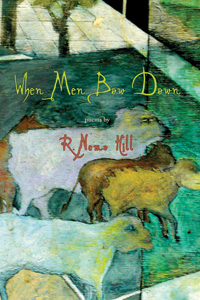When Men Bow Down
By R. Nemo Hill
Dos Madres Press
ISBN: 978-1-933675-76-3
87 Pages
Review by Dennis Daly
The crafty author of this book of poems, When Men Bow Down, manipulates
words, meter, and rhyme into traditional forms, testing his perceptions of
reality from odd angles and in unusual ways. R. Nemo Hill seems intent upon
capturing flickering moments of inspiration from the heavy texture and
weightiness of life’s sordid drudgery and inexorable burdens. He succeeds on a
number of levels.
In Looking Glass, the first poem in his book, Nemo recreates Plato’s
cave with modern complications. The narrator waits for his plane at the
airport, looking out the airport window. Through the window he can see the
shadowy shapes of grounded planes in a rain storm, as well as the reflections
of people coming and going in the climate-controlled building. This vision begs
the platonic question: what is reality? The poet observes,
It’s hard to know what’s here and what is there,
what’s in, what’s out, what’s on or through this glass,
what’s real and what’s a phantom—. Though I stare,
the solid state my eye presumes can’t last.
The focus cannot hold. What then remains?
As the various images transit the window, a voice of the usual kind
pages lost travelers, defining even more the ghostly nature of our everyday
world. The rain alone provides weight and a sense of gravity. This is a first
rate poem searching for an anthology.
The poem Pastel describes the desire of the poet to retreat from the
stark heaviness of his reality into a lighter shade of being. He says,
I long to fade from action
into stupefaction,
slipping through the cracks
that restless fullness lacks.
The poet’s collapse into insubstantiality ends only with death, when
his gray suited body is laid out in brown mud.
Hill again emphasizes the primary substance of illness and death in his
poem, A Bit of Life. Mother and son catch a firefly, put it in a
jar to cheer up the sick man-of-the –house intending to turn off the television
illusion box. It doesn’t work out. Reality out of context, in captivity,
becomes something else. The perception changes as the fire goes out and with it
the original inspiration. The poet puts it this way,
…halfway down the darkened hall she stopped,
and gazing through the glass, sighed with dismay.
“It won’t light up,” she said. “It knows it’s trapped.
I guess the idea’s silly anyway…
I’ll let it go.”
Another poem that pits the brutish world against the weightlessness of
inspiration is Men Like These. Hill meditates on the slow and steady men, the
quiet men who carry the burdens of mankind on their backs. Besides the usual
bundles of ice, furniture and fowl, some of these men carry gold fish, another
version of the firefly. The poet describes his discovery as artificial fruits
which prove to be
bouquets of plastic bags, filled with water,
then knotted and suspended carefully
like ripe grapes, or trussed animals for slaughter.
They’re drinking water salesmen! one decides—.
Until a flash of orange sparks provides
swift proof that circling endlessly within
each liquid satchel—three bright goldfish swim.
The liquid satchel used to transport them is of course artifice, in the
present context: poetry.
The poem Still Life With Weightless Gift offers a seahorse in place of
the firefly and the goldfish. This seahorse , original carved from ebony no
longer exists as a tangible thing. It has evolved into a dream, a perfect
weightless message. After leaving his artifact in the store, un-purchased, the
poet says,
I came home empty –handed. I still am.
And yet a gift in dream or reverie,
where purchase is beside the point, may be
of far more value—freed entirely
from its box and paper wrapper, from its baggage
of counted coin, its ribbon and its bow,
and its delivery tax…
But no less real. This is clearly a platonic universe of forms we live
among.
In the poem entitled Eggs and Strawberries weightlessness and
timelessness are states sought after and ultimately attainable for a lucky few.
The poet argues,
Such carnival attractions may deceive.
And yet the evidence accumulates
that while the awful weight of living grieves
all those who bear the burden of brute fates—
yet, some things and some bodies make escapes
quite unexplained by normal means of measure.
Hill poses this argument within the extraordinary measurements of
poetic meter. Very artificial, yet very effective! Art, specifically Hill’s art, abets man’s
escape from the mundane and awful heaviness of life.
When Men Bow Down, Hill’s spectacular title poem startles with its
mythic and religious intonations. The ritual aspect is so strong that the scene
could be a mosque, a church or a temple instead of a barroom. The metronomic
rites performed by each drinker lends to competing interpretations of community
and loneliness. Although captured by the regularity of meter there are bits of
subtle inspiration here also. Here is the second of four very strong stanzas,
When men bow down to sip their drinks
in dimmed down day or midnight’s glare,
in common rows or solitaire,
in a silence startled by the clink
of ice on glass—as if in prayer,
their eyes close and their focus shrinks
when men bow down to sip their drinks.
Hours easily vanish in this bar (think Edward Hopper’s Night Hawks with
more people or even Van Gogh’s Night Café with its atmosphere of evil), only
the iambic scans and rhythms deliver us safely from the boozy brink of despair
and dread presented here.
The mix of traditional forms and unsettling weighted themes works over
and over again. Hill obviously took some poetic chances writing and compiling
this poetic collection and they paid off. He’s top shelf.

No comments:
Post a Comment